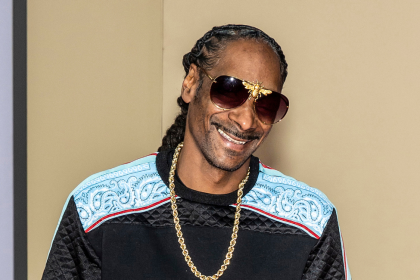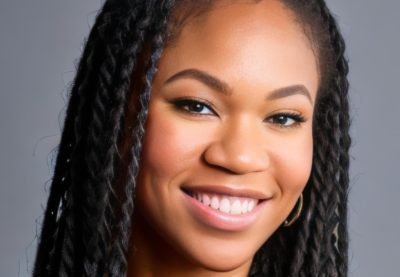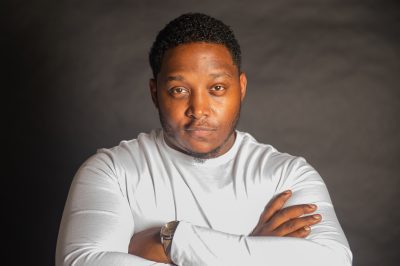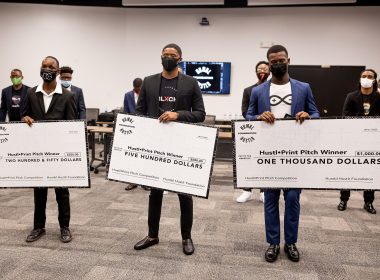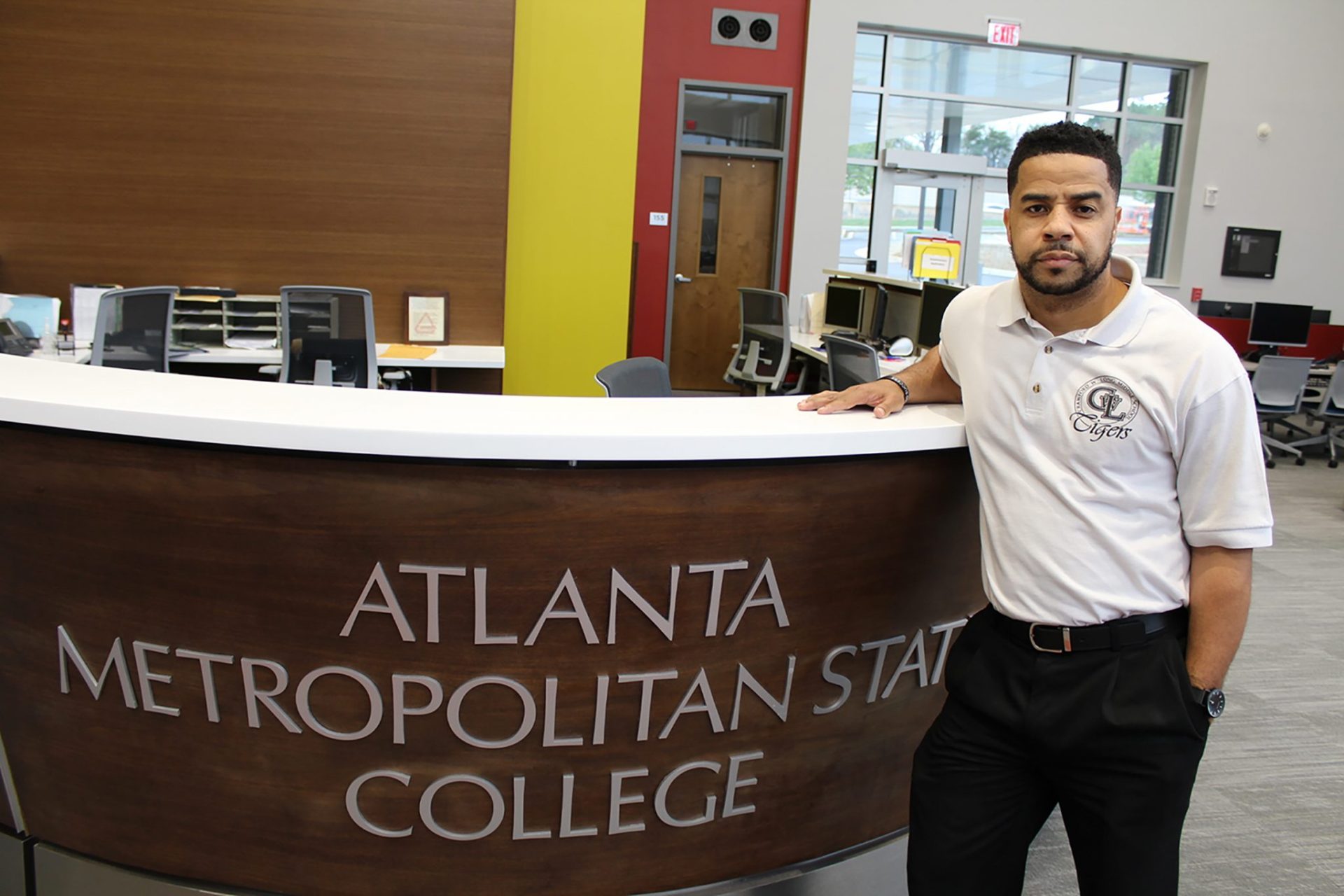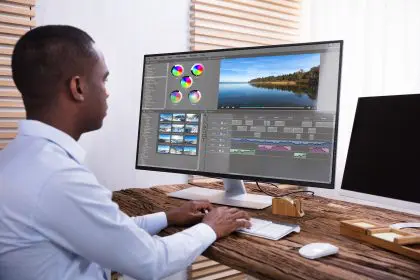
Andreé-Ashley Tarvin-Pyles is someone who finds ways to make things simple; this is why the majority of his work revolves around facilitating workshops, consulting, writing, designing curriculum, and teaching. He began to develop these skills over a decade ago when he began working with various nonprofits in Los Angeles. During this time, he also began his public speaking career.
After his work in Los Angeles, he moved to New Orleans and earned his bachelor’s degree in international business at Dillard University. During his four years at Dillard University, he continued his public speaking, working at schools in the local community, and conducting international research projects with the Melton Foundation.
Once he finished his undergraduate studies, he moved to Chile for work before moving to Las Vegas where he earned his master’s degree in education with an emphasis in curriculum and design.
Over the last five years, Tarvin-Pyles has given over 50 lectures, conducted various workshops with hotels and casinos, designed conversational Spanish curriculum and other academic curricula. He consulted and lectured at a private English academy in Spain and taught. He also has written speeches and biographies and works with the Melton Foundation to refine their programs.
He is currently working on publishing a book of poems and serves as a facilitator for thinkLaw coach.
Read what he has to say.
Tell us about your education, training, and services.
I grew up with an amazing formal and informal education. The formal education consisted of incredible magnet schools from elementary school —Loyola Village Fine and Performing Arts Magnet — to middle and high school — Los Angeles Center for Enriched Studies. The school space was diverse but rigorous, perhaps even more so than I realized at the time. I went onto to earn my undergraduate degree in International Business from Dillard University and, later my Master of Education in curriculum and design from the University of Nevada Las-Vegas. During my undergraduate studies, I also studied in Spain and courses in International Public Policy at the University of Maryland and Spelman.
My informal education consisted of a more eclectic mix of community violence and gangs, while in a family that had the gamut: pastors, former drug addicts, high school dropouts, those with doctorates and everything in between. The skills necessary to navigate the spaces between my formal and informal educational worlds would be the premise for which I would develop the services I offer today.
So, over the last decade, I have been paid to do one of three things:
1) Help people bridge the gap between where they are and desire to be.
2) Take things complicated, or dense, and express them simply.
3) Find ways to make lofty information relatable or digestible.
These services offered come because of my educational experiences, both formal and informal, my work with non-profits, for-profits, schools, and my own individual entrepreneurial work.
How has international travel shaped your views?
My travels international, primarily through the Melton Foundation, changed the way that I view people. I thought, as many do, my norms were the world’s norm. I quickly learned that every continent, country, city, etc. holds its own nuances. This taught me the importance of compassion, patience, and asking for clarity before making assumptions. The world is small, and sometimes we feel as such. My travels have taught me that my insecurities, and ego, are not a necessity for the world…the world is full of people with egos and insecurities. What this looks like can vary country to country; regardless, there is something to be learned in the differences. My travels have taught me how to respect and learn from such differences.
Who is your mentor and why?
I have been fortunate to have a number of mentors. One of these mentors is Taroue Brooks. I mention him in particular because in one of our earliest encounters he asked me, “What do you actually want to do?” This was life-changing. I was riding the wave of talent and reputation, but not asking myself the most intimate of questions: What do I actually want to do? This is not to imply that I was not doing good work but, rather, to point out that good work did not negate the fact I knew that I was deliberate about executing a grander purpose. What was I working toward? Taroue sent me down this path of questioning and has been a key sounding board as I seek to put words to something that feels intangible. He has helped me to discover my grander purpose and understand what it could look like in the day-to-day.
What inspired you to become an entrepreneur?
I am an artist. I need to create and share for a living. As an artist, I need autonomy in my day-to-day. I need to be able to decide that over the next six-months I am going to create X, Y, and Z. Entrepreneurship for me allows me to do this. Also, being an entrepreneur allows me to exist beyond titles…this might seem oxymoronic, but being an entrepreneur allows me to thrive in various spaces without being defined and confined to any particular space for which I work. For instance, my work executives in Vegas hotels do not impede my ability to design curriculum. Or, my work with non-profits, as a consultant or administrator, does not impact my ability to partner with community leaders. All of this was a by-product of pursuing entrepreneurship.
What is it about teaching that you find fulfilling?
Teaching is a space that feels liberating. This might be because I do not teach from the perspective that I am the gatekeeper of knowledge, but rather someone simply in a position to share and shift paradigms. It is a space that I seek to ensure is judgement-free. This allows for me to share my perspective or expertise earnestly, for others to share their perspectives or questions freely, and for us to engage in an open process of being heard and hearing by one another. Any space which feels liberating is one that is deeply fulfilling.
Tell us about the book that you are writing.
It is a book of poems. Since I think in pictures, words have always been like paint to me. When I hear an idea, or watch something happening, my mind translates that into some sort of metaphor. For instance, a friend of mine was talking about their relationship and how they did not realize how much the other person was carrying … my mind immediately sees someone going on a drive with someone and the car being more crowded than expected with bags. I think the simplicity of the writing style and visual clarity should make reading these poems an enjoyable read while not undermining some of the grander ideas and themes of the poem.
What about being an entrepreneur is the most challenging?
The most challenging part of being an entrepreneur is generating enough momentum to a level which I am having to turn-away opportunities rather than still seeking and creating. For me, this can be quite the dilemma as I desire to create change in a way that is not public and tend to avoid attention. I have learned that one can leverage attention to create further opportunities to produce high-quality work. Balancing my desire to not have much attention and generating momentum has been my biggest challenge. Clearly I am learning to reconcile the two!
What advice would you give someone seeking to become an entrepreneur?
Be sure that you understand what the process will look like. I have spoken with many people who admire the lifestyle I have been able to create, the autonomy, the multiple income streams, but do not understand that there is a grace period for which deliberate dedication must spent to simply building momentum. IF one does not understand what that grace period would look like, or expect to make a lot of money quickly, then they are setting themselves up for failure. It would be like someone who does not have a 6-pack stomach to go to the gym for the first time and believing that after 2 weeks of working out everyday that they should have the perfect 6-pack abs. That expectation would be impractical. However, if they understood that it might be at least a month before they begin to see results, they can honor the process a bit more because they understand where they are in the process; thus, allowing them to honor themselves too.
Where do you see yourself in the next five years?
In the next five years, I see myself engaging in more consulting work, more speaking events, and continuing to write poetry. This might seem a bit eclectic, but I have been fortunate to have diverse skill sets…so, in the next five years, I see myself in greater momentum of all the things I am doing currently.


